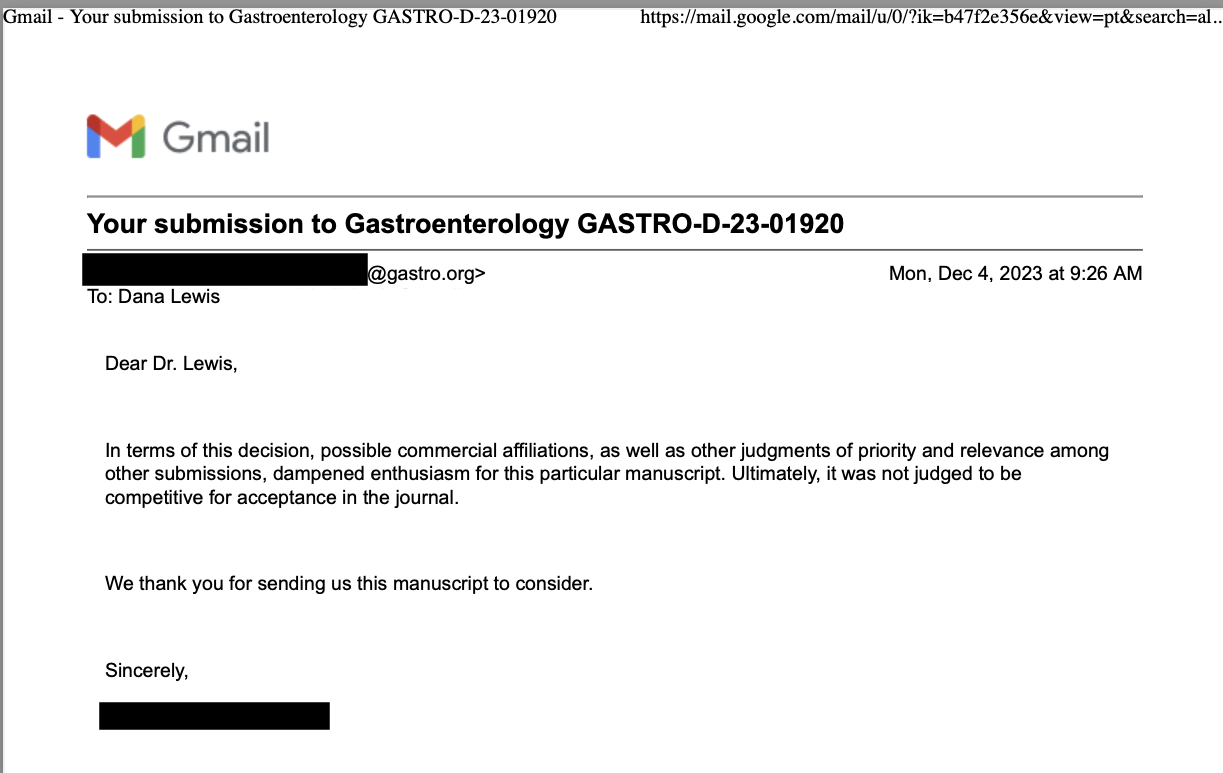Recently, someone published a new clinical practice update on exocrine pancreatic insufficiency (known as EPI or PEI) in the journal called Gastroenterology, from the American Gastroenterology Association (AGA). Those of you who’ve read any of my blog posts in the last year know how much I’ve been working to raise awareness of EPI, which is very under-researched and under-treated clinically despite the prevalence rates in the general population and key sub-populations such as PWD. So when there was a new clinical practice update and another publication on EPI in general, I was jazzed and set out to read it immediately. Then frowned. Because, like so many articles about EPI, it’s not *quite* right about many things and it perpetuates a lot of the existing problems in the literature. So I did what I could, which was to check out the journal requirements for writing a letter to the editor (LTE) in response to this article and drafting and submitting a LTE article about it. To my delight, on October 17, 2023, I got an email indicating that my LTE was accepted.
You can find my LTE as a pre-print here.
See below why this pre-print version is important, and why you should read it, plus what it reminds us about what journal articles can or cannot tell us in healthcare.
Here’s an image of my acceptance email. I’ll call out a key part of the email:
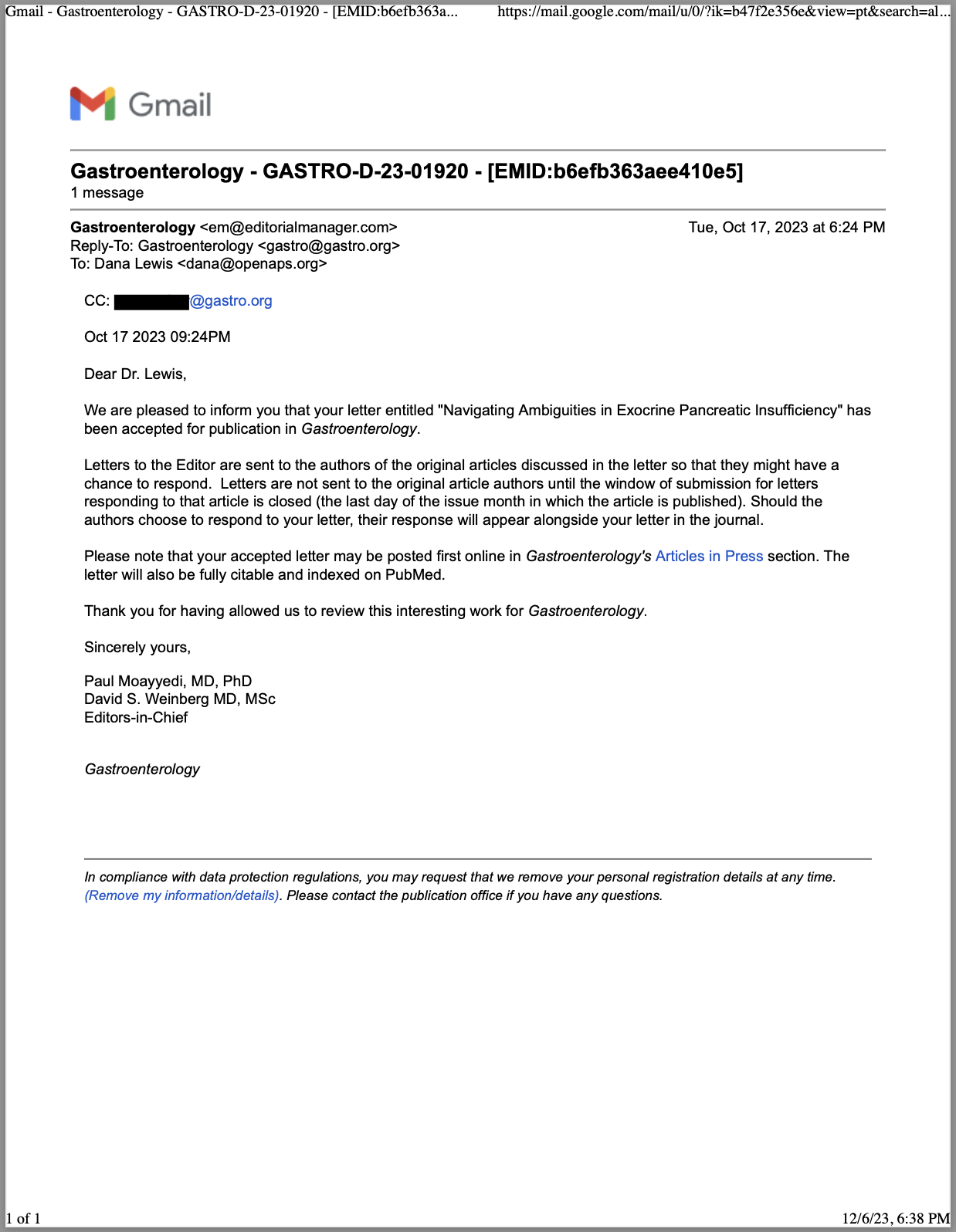
Letters to the Editor are sent to the authors of the original articles discussed in the letter so that they might have a chance to respond. Letters are not sent to the original article authors until the window of submission for letters responding to that article is closed (the last day of the issue month in which the article is published). Should the authors choose to respond to your letter, their response will appear alongside your letter in the journal.
Given the timeline described, I knew I wouldn’t hear more from the journal until the end of November. The article went online ahead of print in September, meaning likely officially published in October, so the letters wouldn’t be sent to authors until the end of October.
And then I did indeed hear back from the journal. On December 4, 2023, I got the following email:
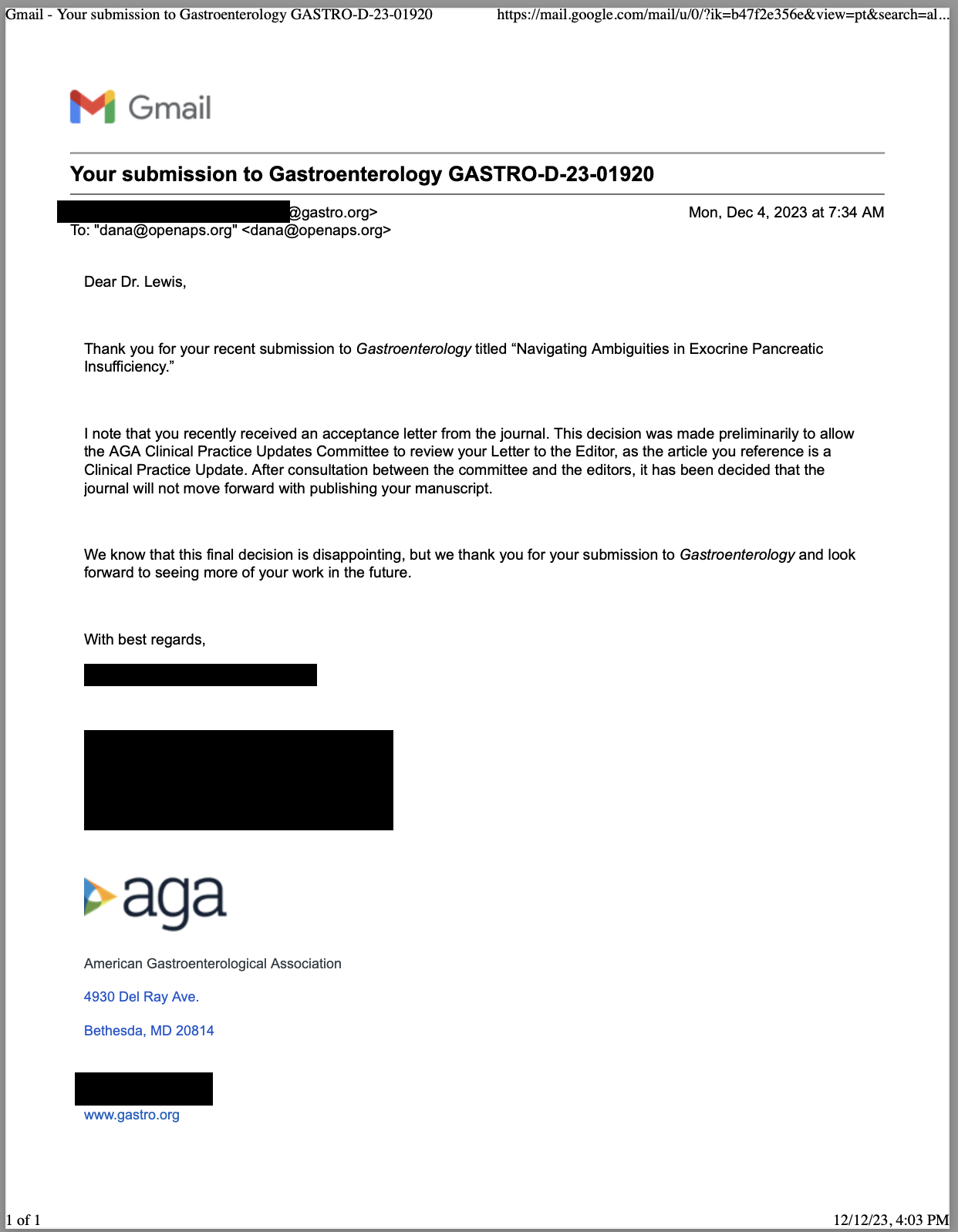
TLDR: just kidding, the committee – members of which published the article you’re responding to – and the editors have decided not to publish your article.
I was surprised – and confused. The committee members, or at least 3 of them, wrote the article. They should have a chance to decide whether or not to write a response letter, which is standard. But telling the editors not to publish my LTE? That seems odd and in contrast to the initial acceptance email. What was going on?
I decided to write back and ask. “Hi (name redacted), this is very surprising. Could you please provide more detail on the decision making process for rescinding the already accepted LTE?”
The response?
“In terms of this decision, possible commercial affiliations, as well as other judgments of priority and relevance among other submissions, dampened enthusiasm for this particular manuscript. Ultimately, it was not judged to be competitive for acceptance in the journal. “
Huh? I don’t have any commercial affiliations. So I asked again, “Can you clarify what commercial affiliations were perceived? I have none (nor any financial conflict of interest; nor any funding related to my time spent on the article) and I wonder if there was a misunderstanding when reviewing this letter to the editor.”
The response was “There were concerns with the affiliation with OpenAPS; with the use of the term “guidelines,” which are distinct from this Clinical Practice Update; and with the overall focus being more fit for a cystic fibrosis or research audience rather than a GI audience.”
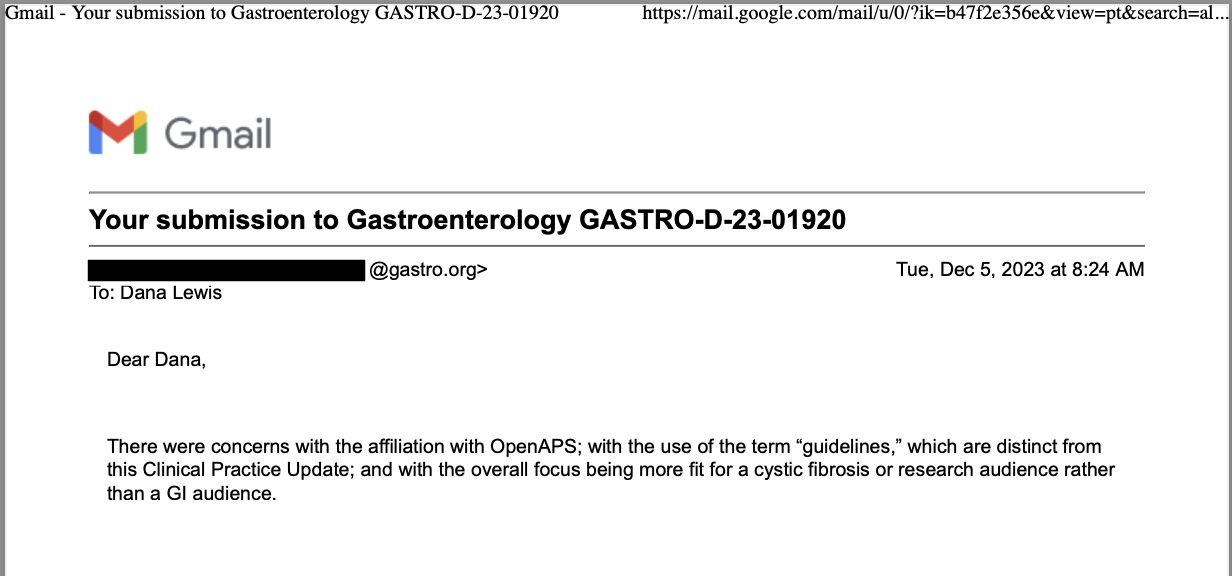
Aha, I thought, there WAS a misunderstanding. (And the latter makes no sense in the context of my LTE – the point of it is that most research and clinical literature is a too-narrow focus, cystic fibrosis as one example – the very point is that a broad gastroenterology audience should pay attention to EPI).
I wrote back and explained how I, as a patient/independent researcher, struggle to submit articles to manuscript systems without a Ringgold-verified organization. (You can also listen to me describe the problem in a podcast, here, and I also talked about it in a peer-reviewed journal article about citizen science and health-related journal publishing here). So I use OpenAPS as an “affiliation” even though OpenAPS isn’t an organization. Let alone a commercial organization. I have no financial conflict of interest related to OpenAPS, and zero financial conflict of interest or commercial or any type of funding in gastroenterology at all, related to EPI or not. I actually go to such extremes to describe even perceived conflicts of interest, even non-financial ones, as you can see this in my disclosure statement publicly available from the New England Journal of Medicine here on our CREATE trial article (scroll to Supplemental Information and click on Disclosure Forms) where I articulate that I have no financial conflicts of interest but acknowledge openly that I created the algorithm used in the study. Yet, there’s no commercial or financial conflict of interest.
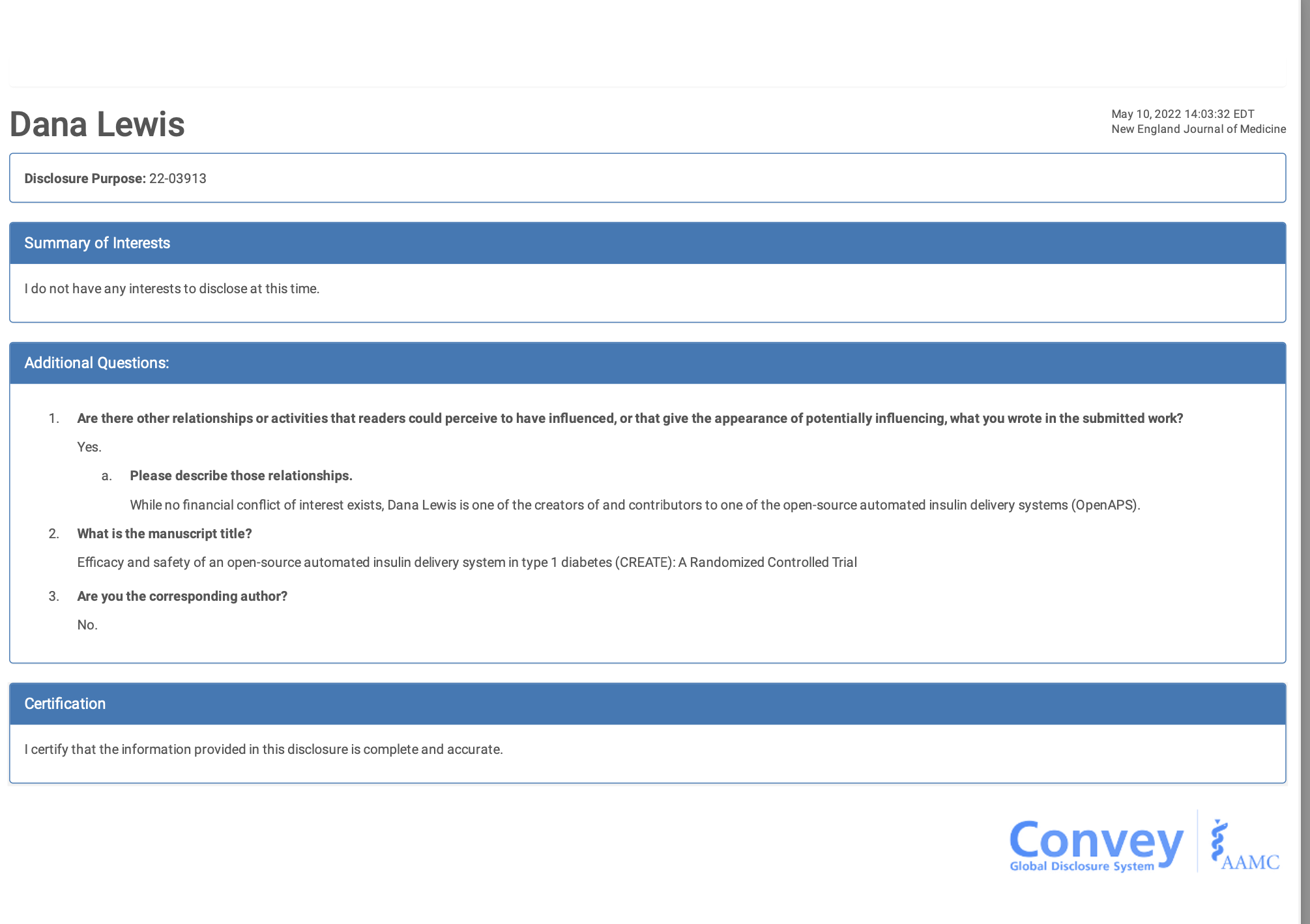
I sent this information back to the journal, explaining this, and asking if the editors would reconsider the situation, given that the authors (committee members?) have misconstrued my affiliation, and given that the LTE was originally accepted.
Sadly, there was no change. They are still declining to publish this article. And there is no change in my level of disappointment.
Interestingly, here is the article in which my LTE is in reply to, and the conflict of interest statement by the authors (committee members?) who possibly raised a flag about supposed concern about my (this is not true) commercial affiliation:
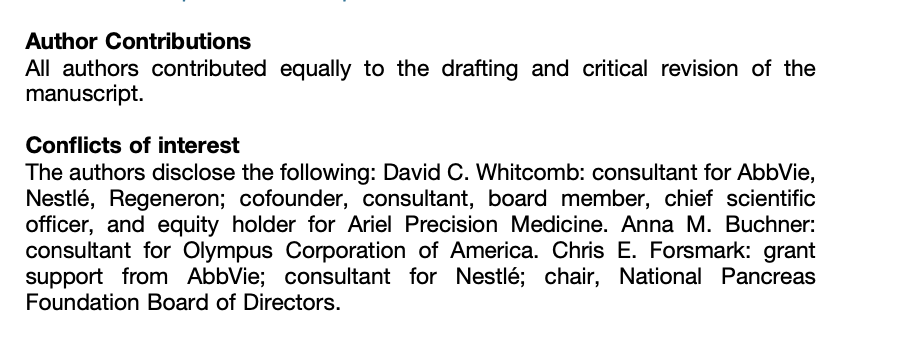
The authors disclose the following: David C. Whitcomb: consultant for AbbVie, Nestlé, Regeneron; cofounder, consultant, board member, chief scientific officer, and equity holder for Ariel Precision Medicine. Anna M. Buchner: consultant for Olympus Corporation of America. Chris E. Forsmark: grant support from AbbVie; consultant for Nestlé; chair, National Pancreas Foundation Board of Directors.
As a side note, one of the companies with consulting and/or grant funding to two of the three authors is the biggest manufacturer of pancreatic enzyme replacement therapy (PERT), which is the treatment for EPI. I don’t think this conflict of interest makes these clinicians ineligible to write their article; nor do I think commercial interests should preclude anyone from publishing – but in my case, it is irrelevant, because I have none. But, it does seem weird given the stated COI for my (actually not a) COI then to be a reason to reject a LTE, of all things.
Here’s the point, though.
It’s not really about the fact that I had an accepted article rejected (although that is weird, to say the least…).
The point is that the presence of information in medical and research journals does not mean that they are correct. (See this post describing the incorrect facts presented about prevalence of EPI, for example.)
And similarly, the lack of presence of material in medical and research journals does not mean that something is not true or is not fact!
There is a lot of gatekeeping in scientific and medical research. You can see it illustrated here in this accepted-rejected dance because of supposed COI (when there are zero commercial ties, let alone COI) and alluded to in terms of the priority of what gets published.
I see this often.
There is good research that goes unpublished because editors decide not to prioritize it (aka do not allow it to get published). There are many such factors in play affecting what gets published.
There are also systemic barriers.
- Many journals require fees (called article processing charges or “APC”s) if your article is accepted for publication. If you don’t have funding, that means you can’t publish there unless you want to pay $2500 (or more) out of pocket. Some journals even have submission fees of hundreds of dollars, just to submit! (At least APCs are usually only levied if your article is accepted, but you won’t submit to these journals if you know you can’t pay the APC). That means the few journals in your field that don’t require APCs or fees are harder to get published in, because many more articles are submitted (thus, influencing the “prioritization” problem at the editor level) to the “free” journals.
- Journals often require, as previously described, your organization to be part of a verified list (maintained by a third party org) in order for your article to be moved through the queue once submitted. Instead of n/a, I started listing “OpenAPS” as my affiliation and proactively writing to admin teams to let them know that my affiliation won’t be Ringgold-verified, explaining that it’s not an org/I’m not at any institution, and then my article can (usually) get moved through the queue ok. But as I wrote in this peer-reviewed article with a lot of other details about barriers to publishing citizen science and other patient-driven work, it’s one of many barriers involved in the publication process. It’s a little hard, every journal and submission system is a little different, and it’s a lot harder for us than it is for people who have staff/support to help them get articles published in journals.
I’ve seen grant funders say no to funding researchers who haven’t published yet; but editors also won’t prioritize them to publish on a topic in a field where they haven’t been funded yet or aren’t well known. Or they aren’t at a prestigious organization. Or they don’t have the “right” credentials. (Ahem, ahem, ahem). It can be a vicious cycle for even traditional (aka day job) researchers and clinicians. Now imagine that for people who are not inside those systems of academia or medical organizations.
Yet, think about where much of knowledge is captured, created, translated, studied – it’s not solely in these organizations.
Thus, the mismatch. What’s in journals isn’t always right, and the process of peer review can’t catch everything. It’s not a perfect system. But what I want you to take away, if you didn’t already have this context, is an understanding that what’s NOT in a journal is not because the information is not fact or does not exist. It may have not been studied yet; or it may have been blocked from publication by the systemic forces in play.
As I said at the end of my LTE:
“It is also critical to update the knowledge base of EPI beyond the sub-populations of cystic fibrosis and chronic pancreatitis that are currently over-represented in the EPI-related literature. Building upon this updated research base will enable future guidelines, including those like the AGA Clinical Practice Update on EPI, to be clearer, more evidence-based, and truly patient-centric ensuring that every individual living with exocrine pancreatic insufficiency receives optimal care. “
PS – want to read my LTE that was accepted then rejected, meaning it won’t be present in the journal? Here it is on a preprint server with a DOI, which means it’s still easily citable! Here’s an example citation:
Lewis, D. Navigating Ambiguities in Exocrine Pancreatic Insufficiency. OSF Preprints. 2023. DOI: 10.31219/osf.io/xcnf6
